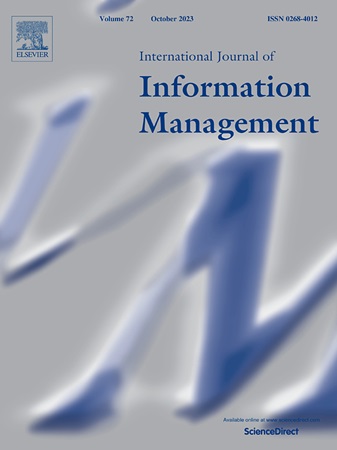Agenda-setting effects for covid-19 vaccination: Insights from 10 million textual data from social media and news articles using BERTopic
IF 27
1区 管理学
Q1 INFORMATION SCIENCE & LIBRARY SCIENCE
International Journal of Information Management
Pub Date : 2025-04-07
DOI:10.1016/j.ijinfomgt.2025.102907
引用次数: 0
Abstract
This study investigates the agenda-setting effects of media in the context of the COVID-19 vaccination by leveraging a cutting-edge machine learning framework, BERTopic, to analyze over 10 million textual data points from social media and news articles. The research highlights a significant divergence between public opinion, primarily expressed on Twitter, and the media agenda, challenging traditional agenda-setting theories in public health crises. Specifically, while public discourse centered on vaccination-related concerns and negative sentiments toward vaccination policies, media coverage diversified to include topics such as politics, foreign affairs, and economics. The proposed framework systematically integrates data collection, preprocessing, and advanced topic modeling to enhance interpretability and efficiency. By adopting BERTopic, this study advances beyond traditional Latent Dirichlet Allocation (LDA) models by offering superior clustering and contextual understanding of unstructured text data. The framework demonstrates its utility in identifying actionable insights for public health practitioners, policymakers, and information systems researchers, providing a robust methodology to track and evaluate public sentiment and media narratives during health crises. Ultimately, this study emphasizes the critical need to align media messaging with public concerns to improve vaccination campaigns and public health communication. It contributes to the theoretical understanding of agenda-setting in the digital era while offering practical guidelines for leveraging social big data in multidisciplinary applications.
covid-19疫苗接种的议程设置效应:来自社交媒体和新闻文章的1000万文本数据的见解
本研究通过利用尖端机器学习框架BERTopic分析来自社交媒体和新闻文章的1000多万文本数据点,调查了媒体在COVID-19疫苗接种背景下的议程设置效果。该研究强调了主要在Twitter上表达的公众舆论与媒体议程之间的重大分歧,挑战了公共卫生危机中传统的议程设置理论。具体而言,公众话语集中在疫苗接种相关的担忧和对疫苗接种政策的负面情绪上,而媒体报道则多样化,包括政治、外交和经济等话题。该框架系统地集成了数据收集、预处理和高级主题建模,以提高可解释性和效率。通过采用BERTopic,本研究超越了传统的潜在狄利克雷分配(Latent Dirichlet Allocation, LDA)模型,对非结构化文本数据提供了优越的聚类和上下文理解。该框架证明了其在为公共卫生从业人员、政策制定者和信息系统研究人员确定可操作的见解方面的效用,并提供了一种可靠的方法来跟踪和评估卫生危机期间的公众情绪和媒体叙述。最后,本研究强调,迫切需要将媒体信息与公众关注的问题结合起来,以改善疫苗接种运动和公共卫生沟通。它有助于从理论上理解数字时代的议程设置,并为在多学科应用中利用社会大数据提供实践指导。
本文章由计算机程序翻译,如有差异,请以英文原文为准。
求助全文
约1分钟内获得全文
求助全文
来源期刊

International Journal of Information Management
INFORMATION SCIENCE & LIBRARY SCIENCE-
CiteScore
53.10
自引率
6.20%
发文量
111
审稿时长
24 days
期刊介绍:
The International Journal of Information Management (IJIM) is a distinguished, international, and peer-reviewed journal dedicated to providing its readers with top-notch analysis and discussions within the evolving field of information management. Key features of the journal include:
Comprehensive Coverage:
IJIM keeps readers informed with major papers, reports, and reviews.
Topical Relevance:
The journal remains current and relevant through Viewpoint articles and regular features like Research Notes, Case Studies, and a Reviews section, ensuring readers are updated on contemporary issues.
Focus on Quality:
IJIM prioritizes high-quality papers that address contemporary issues in information management.
 求助内容:
求助内容: 应助结果提醒方式:
应助结果提醒方式:


